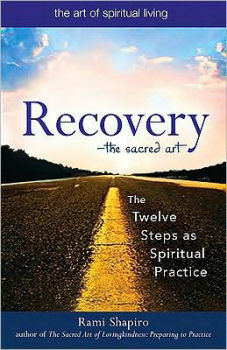
|
Posted August 25, 2009
Book: Recovery: The Sacred Art: The Twelve Steps as Spiritual Practice Author: Rami Shapiro Skylight Paths. Woodstock. Vermont. 2009. Pp. 199 An Excerpt from the Jacket:
Rami Shapiro describes his personal experience working the Twelve Steps as adapted by Overeaters Anonymous and shares anecdotes from many people working with the Steps in a variety of settings. Drawing on the insights and practices of Christianity, Judaism, Buddhism, Taoism, Hinduism, and Islam, he offers supplementary practices from different religious traditions to help you move more deeply into the universal spirituality of the Twelve Step system. Admitting our wrongs to another While the first two phases of Step Five are serious, time-consuming, and often painful, they pale in comparison to the third phase: confessing our errors to another human being. “I was scared to death to admit my shortcomings to my sponsor,” Natalie, a compulsive gambler and alcoholic, told me. “I was certain she would find me repulsive and drop me like a hot potato. I know that is not how it’s supposed to work. I mean, your sponsor isn’t supposed to react to what you’re confessing, just provide a safe space for the act of confessing, but I was still horrified by the thought of it. But she was great. She listened, that’s all. There was no judgment at all, just 100 percent acceptance. I felt somehow cleansed by the process.” Confession is a powerful tool for self-cleansing, and when used in connection with introspection, it can remove the limitations of introspection. Lithuanian Rabbi Israel Salanter (1810-1883), while arguing for the importance of instrospection, a process he defines as “searching each and every human action,” nevertheless warns us of its limitations: “Most of the time people view themselves mistakenly. They recognize neither their deficiencies nor their unworthy character traits.” Rabbi Salanter was the founder of the Musar movement in Judaism, Musar meaning “instruction” and refers to a spiritual discipline focused on character building. At the heart of Musar is the diminution of egocentricity through acts of humility and the confession of wrongs. Rabbi Salanter suggests that we examine ourselves “not only in solitude but also in conjunction with others. The hazards of self-deception can be materially reduced when an intimate friend points out our unworthy deeds and character traits.” He advises us to acquire a close friend with whom to associate continuously. In the context of Twelve Step recovery, this friend is our sponsor. “I had no problem confession my defects to God,” Frank, a middle-aged insurance salesman, said at an AA meeting. “I figured God knew them already, so it was no big deal. And it was easy to confess them to myself because I knew them as well as God did. But when it came to telling someone else, man, that was tough.” Frank was in multiple Twelve Step programs for a complex of what he knew to be interrelated addictions. “I act compulsively, I’m afraid of everything. I’m angry with everyone. So I eat and drink and drug myself to oblivion. See, I can say that to you without any worries, but that isn’t Step Five. Step Five is like having someone follow you around videotaping your life 24/7 and then sitting down with you and watching it. Nothing is hidden. It isn’t just humbling, it’s devastating. But I was lucky, my sponsor was a wise old bastard who had heard it all and done even more. He just listened. No judgment, just 100 attention. And when I got through it, I felt fifty pounds lighter.: There is no one way to do this final phase of Step Five, but there is a key element: the trustworthiness of your sponsor, teacher, mentor, or spiritual friend. Whomever you ask to hear your confession, make sure you can trust that the person listening will never use what you tell him against you. You want to be perfectly honest with him but you cannot take that risk unless you are sure you are safe. How can you be certain this is the right person with whom to do Step Five? There is no foolproof way to make this determination, but here are some hints: 1. Is the person willing to give you enough time to work through this aspect of Step Five? If there is a sense of being rushed, either the timing is wrong, or the person is wrong. 2. Notice, whether in other sponsor settings your sponsor is focused. Does she answer the phone during your conversations, or interrupt your time together to deal with others? In other words, if your sponsor is easily distracted, she may not be the person with whom to take Step Five. 3. If your sponsor seems offended by your behavior, or by something you have said during other sponsor meetings; if he seems judgmental in any way, then again he may not be the best person with whom to take Step Five. Table of Contents: 1. The gift of powerlessness 2. The hope of restoration 3. Deciding to be free 4. Searching the ego 5. Confessing our wrongs 6. Defect removal 7. Asking for freedom 8. Naming the harmed 9. Making amends 10. Attending the moment 11. Conscious contact with God 12. Carrying the message 13. First step, last step |
|
